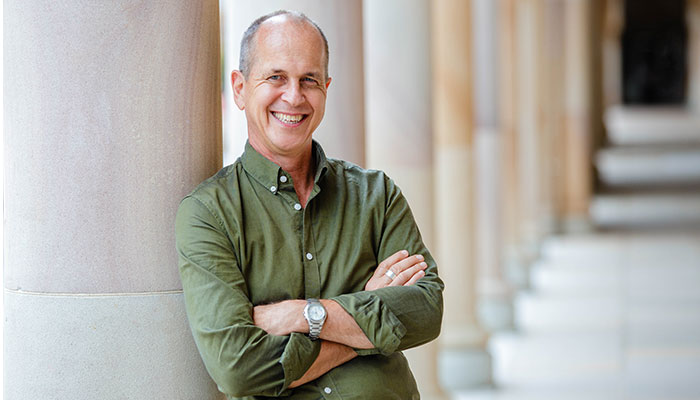The COVID pandemic played havoc with news. It created a seemingly insatiable public appetite for every available crumb of information. It evaporated the traditional distance between the journalists and the story. It accelerated innovative news-gathering techniques and then pushed them to breaking point.

At first it drove audiences back to legacy news outlets and created a sense of common suffering, before it reversed those trends, fragmenting audiences and unravelling trust. It forced news editors to find a near impossible balance between reporting facts and avoiding panic.
And as in so many areas of our lives through that period, it brought out the best and the worst in the media and that three-way relationship with the public and the government.
The University of Canberra's News and Media Research Centre (N&MRC) showed that early on we saw a model version of the way the "fourth estate" should work. Their research placed news stories into four broad categories: information, experience, impacts, and conflict and blame.
In the first months of the pandemic, most fell into the first category. The stories were based on scientific information, solidly sourced and carefully checked. Audiences flocked to legacy news sites, pushing their page views to record highs, and triggering a trust-bump. Audiences found confidence in both the news and the government's capacity to manage the crisis. The result was a broad common sense of purpose and a comparatively successful national response.
The news business has a lot to answer for in the way it handled the pandemic, but it is not entirely the industry's fault.
But as the pandemic wore on, the N&MRC found that the precious consensus began to unravel. News stories shifted away from straight reporting of scientific information to sexier but more divisive stories based on conflict and blame. State premiers abandoned the national approach and went their own ways; early science was superseded, and the public grew suspicious. As one of the authors in Pandemedia wrote, "the concept of 'truth' became less about facts and more about subjective experience".
Crucially, the surge in bad information prompted the World Health Organisation to coin the concept of the infodemic – a parallel plague of bad information that extended and intensified COVID's impact, and ultimately cost countless lives.
The trouble with algorithms
The news business has a lot to answer for in the way it handled the pandemic, but it is not entirely the industry's fault. The digital revolution has created a model that flattens information. Online, a good quality, well sourced and carefully checked news story looks much the same as a conspiracy theory written to look like news. Even seasoned news consumers can sometimes struggle to spot the difference. At the same time, the industry is trapped in a business model that rewards sensational gossip over sober reporting, polemic over analysis, and speed over accuracy.

Truth vs subjective experience: Macquarie University Professor of Journalism Peter Greste will host a panel discussion on how COVID changed journalism on Friday August 11, 2023.
We tend to forget that social media algorithms are designed by engineers to monetise our attention for the profit of companies based offshore. They are not engineered for us. They are not designed for our communities, or for good conversation. They are not engineered to help and support positive public debate.
If we consider social media as a form of public utility – the way we communicate, do business and conduct government – we need to think about how we might regulate and redesign the algorithms so they serve our purposes. That will always be challenging in a world where that debate itself is controlled by the algorithms we are seeking to change, but it is a debate we have to have.
That also means we need to think seriously about how we finance and support good, responsible, and ethical journalism capable of doing the job we need in a functioning democracy. Forcing journalists to work in an environment designed to reward our most basic instincts is never going to produce good quality news.
What makes a good journalist today?
The qualities journalists need in 2023 are the ones they've always needed. They must be curious and rigorous. In their questioning, they need to be fiercely independent. They need to be sceptical, not cynical. They need to be good storytellers, able to drill down to the core of an issue to discover not just what happened, but what it means and understand how that translates to a wider audience. Core skills remain: resilience, patience, and a commitment to accuracy and detail.
What has changed are the tools used to tell the stories, the technology. That demands a degree of technical flexibility and adaptability that wasn't there in the past.
Above all, the pandemic highlighted the importance of trust. The annual Edelman Trust Barometer confirmed a spike in public confidence in news in the early part of the pandemic, and that clearly contributed to the broad success of the national response. But the latest edition reveals that almost half of all Australians (45 per cent) think the nation is more divided today than it was in the past, while a slim majority (51 per cent) believe journalists are a major driving force of that division.
While we can't force it, to rebuild the trust we can, perhaps, put in place incentives and boundaries that encourage the best kind of journalism and the public engagement it brings.
Panel Discussion Event
Tracey Kirkland (a broadcast and print journalist) and Gavin Fang (ABC Deputy News Director), will join a panel hosted by Macquarie University Professor of Journalism Peter Greste, along with panellists Michelle Grattan (veteran political reporter and editor) and Tory Maguire (Executive Editor of Nine Publishing's metro mastheads)
on Friday August 11 in the Screen Studio, Room 189, 10 Hadenfeld Avenue, Macquarie University.
Registration: https://www.eventbrite.com.au/e/pandemedia-how-covid-changed-journalism-tickets-662704676527?aff=oddtdtcreator






